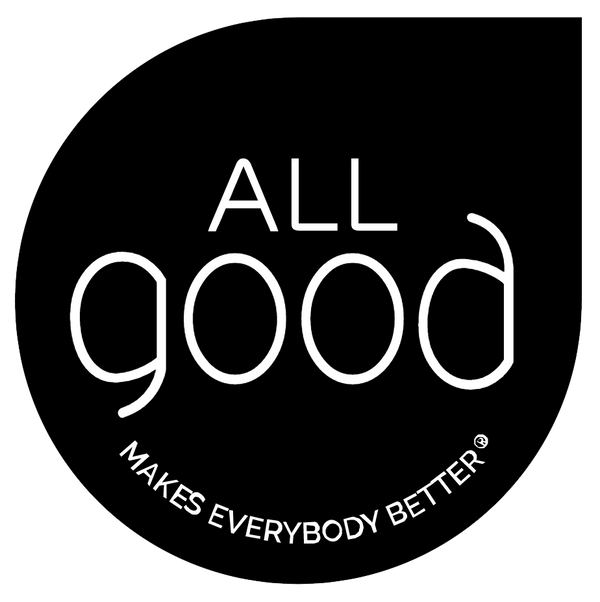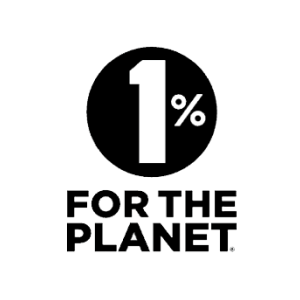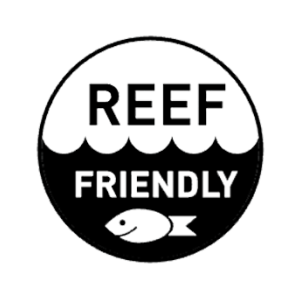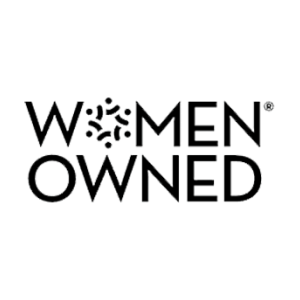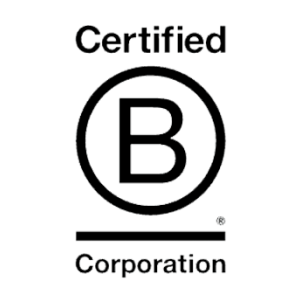
FAQs
About All Good
What is All Good's vision?
People are inspired to live in balance with nature.
Is All Good B Corp Certified?
Yes, we are a certified B Corporation. This gives us official street-cred because these sustainability vigilantes certify that we balance purpose and profit while considering the impact of our decisions on our employees, customers, suppliers, community, and environment. All Good is a proud triple bottom line business – meaning social and environmental responsibility is equally as important as profits. Send up the bat signal.
Where are All Good's products made?
Our products are made in the USA using all good botanical ingredients that are ethically sourced and some are proudly grown in our farm.
Are All Good products vegan?
Most of our products are vegan, however we do incorporate beeswax into a handful of our products (Lip Balms, All Good Goop, SPF 50+ Sunscreen Butter Tins and Sunscreen Butter Sticks, and our SPF 30 Coconut and Unscented Sunsticks). Our beeswax is sourced from a fellow B-Corp that treats its bees ethically and sustainably. Beeswax or not, all of our products are Leaping Bunny Certified, meaning that we (and the companies we source from) do not conduct product testing on animals.
What kind of Vitamin E do you use in your products?
We use non-GMO Tocopherol (Vitamin E) in our products.
Do you use animal testing?
No way, Jose — we test on actual humans! We’re all about cruelty-free cosmetics and partner with membership affiliates like PETA and Coalition for Consumer Information on Cosmetics (Leaping Bunny) to encourage consumers and companies to say no to animal testing. It’s the 21st century, people – let’s just test on humans or robots. Paging the Terminator.
What does “OTCO” on your labels mean, and how does it relate to USDA Certified Organic?
Long answer: Oregon Tilth Certified Organic (OTCO) is the certifying agency that ensures products meet the standards of the national certifications: either USDA’s National Organic Program or NSF’s body care specific organic standard. Short answer: Made with good stuff.
Sensitivities
Are All Good products safe for sensitive skin?
Our products are made with botanical ingredients that are intended to soothe, relieve, and safely protect your skin. That said, we’re experts on making skincare products, but YOU are the expert on your own body. If you know you’re sensitive to something, check the ingredients list first. If you’re unsure, we suggest you perform a skin patch test every time you use a new product. Just rub a little of the product on your inner arm (or other sensitive skin) and check for redness or rash in the morning. If it looks concerning, stay far, far away. If it looks normal, you should be fine to use the product. If you’ve got any questions about our products, feel free to drop our customer service a line (PSA: we have about as much medical street cred as George Clooney) – we’ll do our best to answer your questions.
Are All Good products gluten-free?
Yes! All Good products’ ingredient lists are gluten-free! However, although our manufacturing lines are thoroughly cleaned between production runs, the facilities that manufacture our products are not certified gluten-free facilities, so we cannot 100% guarantee that there would be no risk for cross-contamination.
Are your products safe for babies?
Ah, babies – those sweet little mysteries. We can’t tell you how to parent, but we CAN give you the facts: Per FDA guidelines, babies under 6 months of age should not use sunscreen. (They recommend keeping babies out of the sun or using clothing like a long-sleeved rashguard and a hat to protect them from the sun.) After 6 months, they should be okay to use sensitive sunscreen (again, that’s according to the people in lab coats.) They recommend applying the sunscreen to a small area first, just to make sure there aren’t any unforeseen allergies (new humans = go slow). Our All Good Kid’s Sunscreen formulas (all of ‘em: lotions, sprays, and sticks) are developed for sensitive skin and are made with organic and botanical ingredients. If you need info on a specific products or just want to share cute baby photos, get in touch at info@allgoodproducts.com.
Are All Good products safe for pregnant or lactating women?
First of all, congrats on your little bundle of joy and best of luck getting the zzz’s when you can (it’s a good thing they’re so cute… ). We strive to use the purest ingredients we can find with the intention of making products that aren’t harmful to anyone, including pregnant women, lactating women, and their littles. That said, we recommend you consult with your doctor or pediatrician if you have any questions about using our products while pregnant or lactating.
Are All Good products safe for people with peanut/tree nut allergy?
Our product ingredients do not include any peanuts or other tree nuts. However, most of them do contain some combination of coconut oil, shea butter, and buriti oil. Though production lines are cleaned thoroughly between production runs, we do not produce our products in certified peanut-free and tree nut-free production facilities.
Products
Sunscreens
What are the ingredients of your sunscreens?
We’ve got a few kinds, so let’s break them down. Our Reef Friendly sunscreens use an active ingredient of non-nanoparticle zinc oxide; zinc oxide works as a physical barrier (as opposed to a chemical absorber) between your skin and the sun to protect you from UVA/UVB rays. We also add other safe, organic ingredients like buriti oil, aloe, and calendula to our sunscreen formulas to help the zinc apply smoothly to your skin. Our Kid’s Sunscreens have added chamomile for sensitive skin. To see a full list of ingredients, check out the product page of the sunscreen you’re interested in on our website. And of course, all of our sunscreens are Reef Friendly, which makes them human-friendly too.
Do you use nanoparticle zinc in your sunscreens?
Our reef-friendly sunscreens use an active ingredient of non-nanoparticle zinc oxide; zinc oxide works as a physical barrier (as opposed to a chemical absorber) between your skin and the sun to protect you from UVA/UVB rays. We also add other safe, organic ingredients like buriti oil, aloe, and calendula to our sunscreen formulas to help the zinc apply smoothly to your skin.
Do you use nanoparticle zinc in your sunscreens?
Our reef-friendly sunscreens use an active ingredient of non-nanoparticle zinc oxide; zinc oxide works as a physical barrier (as opposed to a chemical absorber) between your skin and the sun to protect you from UVA/UVB rays. We also add other safe, organic ingredients like buriti oil, aloe, and calendula to our sunscreen formulas to help the zinc apply smoothly to your skin.
Are All Good sunscreens noncomedogenic?
“Non comedogenic” is just a fancy way of saying “this won’t give you comedones,” ie: clogged pores. Our sunscreen products follow the non comedogenic guidelines (they do not contain ingredients known to clog or irritate pores) but they have not been certified as non comedogenic. (Mainly because the certification process involves testing on animals and we aren’t about that).
What is the best sunscreen to use on my kid?
We’re all kids on the inside. On the outside it’s just a matter of preference. Our Kid’s sunscreen line, as compared to our Sport sunscreen line, is extra nourishing for sensitive skin. Here’s the main difference: sunflower oil vs. jojoba oil. Our Kid’s Mineral Sunscreen has soothing calendula, chamomile, and sunflower oil instead of the jojoba oil used in our Sport mineral sunscreen. Some people like the jojoba oil, others prefer the added ingredients in the Kid’s… pick your (non) poison. We recommend a cute layer of sun clothes for little ones younger than 6 months, but you can also check with doc to ensure using a mineral sunscreen is safe for your baby.
Do your mineral sunscreens and sunsticks work in water or if I sweat a lot?
If you’re in the water or just sweat excessively (no judgement – we feel you), you should re-apply sunscreen every 80 minutes (that’s for ALL sunscreens, BTW). For normal, every-day use, we suggest reapplying every 2 hours. For high-water situations, we’d suggest the Mineral Sunstick since it’s an oil and wax base and stays on better.
I’ve tried a lot of zinc sunscreens and some are pastier than others, does this matter?
Assuming they are both non-nano and have a similar SPF, then no – they’re exactly the same. We tested our various non-nano zinc sunscreen lotions in our fancy UV lab, and found that the visibility of the white zinc oxide (even after it was rubbed in) is not an indicator of how effective the product is. What it DOES indicate is how well the lotion was formulated to blend in with skin and disperse zinc oxide particles evenly.
What is different about your tinted sunscreen line?
You mean, besides the color? The new All Good SPF 30 Tinted Sunscreen Lotion is just a darker cousin to our Sport Sunscreen Lotion. It still has the same Reef Friendly formula, it’s just tinted with iron oxides to blend with most skin tones (not just Casper’s). No matter the tint, container, name or application, all of our sunscreens are made with non-nano zinc oxide and other minerals that are free from all of the bad stuff.
What’s the difference between UVA and UVB rays? How do you protect against both?
Can we get a translator up in here, please? SPF(sun protection factor), UVB (ultraviolet b rays), UVA (ultraviolet a rays). Now that we’ve settled that, let’s move on. SPF technically only measures protection from UVB rays – the radiation primarily responsible for sunburn (think of “B as in burn”). UVA rays are related to other forms of sun damage like immune suppression, skin aging, and free radical generation, ie: the stuff that does long-lasting damage and can lead to skin cancer. (Think of “A as in AVOID AT ALL COSTS!!!”).That’s why you want to look for products labeled “broad spectrum” to protect against multiple types of ultraviolet rays. All of our sunscreen products have been tested and determined efficient broad spectrum sunscreens in compliance with FDA standards. That means they adequately protect against both UVA and UVB radiation. Now go frolic and be free.
Do All Good SPF products have a UVA/PA+ protection rating?
Ah yes, the bureaucratic side of skin care. We haven’t adopted the PPD system (or PA+) testing system since it’s still not commonly known or understood in the US (kudos to YOU for being on top of things!). The PPD/ PA+ testing system scans for UVA ray protection and is used primarily in Europe and Asia. Going forward, we may choose to complete PPD testing on our sunscreens, but by current FDA (Federal Drug Administration) standards, all of our sunscreens pass UVA and UVB broad spectrum testing.
For all the nerds out there, the FDA requires that broad spectrum sunscreens pass critical wavelength >370 nm testing, which ours do. Zinc Oxide, the only active ingredient in our sunscreens, is a broad spectrum sunscreen agent, which means it protects both against UVA and UVB radiation. We conduct in-vitro testing with third-party labs to verify our product’s SPF ratings.
What is the difference between non-SPF, SPF 15 and SPF 20 lip balm?
Rule of thumb: SPF intensity should correspond to the amount of sun you’re exposed to. Headed to Arizona? Take SPF 20. Headed to the catacombs underneath Paris? Take non-SPF (and maybe an exorcist). Non-SPF balms are great for night-time and indoor use, SPF 15 balms are ideal for short sun exposure (short hikes, running in and out of tunnels), and SPF 20 balms are perfect for prolonged direct sun exposure. When in doubt, we go with SPF20. Better safe than sunburned.
I got sunscreen on my clothes and now they’re stained. What do I do?
First, don’t worry – there’s no crying in baseball and suncare. Second, examine the stain — what color is it? If you’ve ever gotten that weird orange-colored stain on your clothes after a day at the beach, we assure you that zinc sunscreen was not the culprit. It’s more than likely that the sunscreen that dyed your clothes orange included the chemical Avobenzone – a “gateway” ingredient commonly used in chemical sunscreens that we deem a BIG NO-NO. If your stain is white from zinc sunscreen or a light brown color from tinted zinc sunscreen varieties, assemble your ingredients and get to work. You’ll need: a dull-edged knife, baking powder, white vinegar, hot water and a little laundry detergent. What to do: Scrape off the excess zinc with the knife. Sprinkle a bit of baking powder over the stain and let it absorb the grease for a couple minutes before brushing off the powder. Soak the stained article in hot water mixed with detergent and gently rub out the stain. Transfer the article to soak in white vinegar for 15 minutes, and then put it through the washer/dryer as you normally would. Sunscreen, pasta sauce, butter… same stain-removal technique. You’re welcome.
Do tinted sunscreens stain clothing?
Let’s put it this way – MOST things stain white colored clothing (hence the shelves of bleach at the market). So we recommend not rubbing your face on light colored clothing, towels, furniture if you’re wearing tinted sunscreen. If you do happen to get our zinc-based sunscreen on something, please follow the steps relayed in a previous FAQ, “ARGGG! I got zinc sunscreen on my clothes… how do I get it off?”
Why are chemical sunscreens bad for coral reef ecosystems?
There are a variety of different chemical sunscreen ingredients (aka “The Awful Eight”) that have been found to cause bleaching, deformities, DNA damage and ultimately death in coral when sunscreen washes off beachgoers or is discharged into wastewater treatment plants and deposited into bodies of water. We stay far far away from those ingredients and proudly all of our mineral-based sunscreens aren’t harmful to reefs and marine life.
What is the difference between reef safe and reef friendly?
It’s the same thing, just with a different name. (It’s just like how Americans call it the “John” and Brits call it the “Loo”). To curb the confusion, the Safe Sunscreen Council is working to propose legislation that standardizes how terms like Reef Safe and Reef Friendly are used.
How can I fact-check if a sunscreen is really “Reef Friendly”?
There’s this little phenomenon out there called “greenwashing,” where companies will claim they have eco-friendly products because a portion of the product is made sustainably. When it comes to sunscreen, a lot of companies produce chemical sunscreens that are touted as “Reef Safe” because they don’t contain Oxybenzone and Octinoxate (the two chemicals banned in Hawaii), but they contain several other “Awful Eight” chemical sunscreen ingredients (Oxybenzone, Octinoxate, Octocrylene, PABA [Aminobenzoic Acid], Enzacamene, Octisalate, Homosalate, Avobenzone). That’s like baking a cake without butter but with loads of sugar and calling it “healthy.” The only way to know if something is truly reef friendly is to check the ingredients. If it contains ANY of the Awful Eight ingredients, it’s no good for reefs.
All Good Goop
What are the ingredients used to make All Good Goop?
Central to Goop’s ingredient list is calendula — a fragrant, softening, and anti-inflammatory flower that allows for Goop’s all-in-one dynamic power. Every October, the Goop journey starts on our farm with a calendula crop. The healing powers continue when the calendula flowers are harvested, solar dried, and blended with dried organic comfrey, lavender, plantain, and yarrow (all of which are chock-full of nature’s magic healing powers). These herbs are infused into organic extra virgin olive oil, mixed with vitamin E, lavender, and ~sustainably-sourced~ beeswax.
I use All Good Goop for everything, but is it safe to use on my dog’s paws?
Does a dog poop in the woods? Yep, you can use All Good Goop for your dog! It works great for raw paws, hotspots, and any other knicks and scratches. Just make sure not to apply too much since your pooch might lick it off… and we’ll spare you the details, but let’s just say it’s medically referred to as “loose movements.”
Deodorants
Do your deodorants contain aluminum?
Nope. The only thing that contains aluminum is our beer fridge. All of our deodorants are aluminum-free, so they won’t stop you from sweating but they WILL mitigate odor and moisture. We use propandial (the “glide on” ingredient, made from non-gmo sugarcane), saccharomyces (an enzyme that helps eat bad bacteria), and arrowroot powder (to help absorb moisture).
Are your aluminum-free deodorants effective?
We’ll let one of our customer reviews take this one: “Hands down the best deodorant EVER! I’ve never used any deodorant that prevents odor as well as this. I’m talking 10 mile runs in 80 degree weather without smelling bad!”
I’m switching from conventional deodorant to an organic one. What do I need to know?
Here’s the Cliff Notes to “What To Expect When You’re Expecting to Change Deodorants”: It typically takes the body about 30 days to detox after using an aluminum-based deodorant (seriously, that stuff is no bueno). Just be patient and know it WILL get better. When applying, the most effective time to apply deodorant is about 10 minutes after the shower. If it’s not a shower day, give your armpits a little wipedown with a soapy washcloth before applying – that will help the deodorant to keep you fresh longer. After about 30 days you should be as fresh as a June Rose.
Lotions
Can I use your body lotions on my face and neck?
You can use them on a boat, you can use them with a goat… and yep, on your face and neck too! All of our body lotions are formulated with ingredients that are not to be an irritant or clog pores, but they have not been technically certified as non comedogenic. “Non comedogenic” is just a fancy way of saying “this won’t give you comedones,” ie: clogged pores.
Packaging
Are All Good Products plastic-free?
Single-use plastics suck. As a company, we are committed to sustainable practices and do our best to rid our product line of unnecessary plastics. Many of our products come in glass or metal containers that can be cleaned out and recycled (or better yet, reused!), and our lip balm and sunstick tubes are made from a minimum of 50% recycled plastic (in the industry, we call that post-consumer recycled… AKA, PCR). As of 2020, our sunscreen sport and kids tubes will be the highest percentage of PCR we’ve found – we’re switching to 100% PCR caps and 65% PCR product tubes. And the search for alternatives continues every day — we’re currently working with innovative companies to find more environmental and cost-effective alternatives for our product tubes. We’re on the hunt so if you see something you dig, drop us a line – we’re all ears.
How can I re-use the packaging from my All Good product?
Congratulations, you are officially our favorite customer. Any of our products that come in jars and spray bottles can be washed out and reused. Some ideas for jars: spice jars, herb jars (ya, you know the kind), office supply holders, containers for lunches, kids crafts – great for anything small, loose and portable. Some ideas for sprayers: water for plants, DIY surface cleaner, spritzer for hot days and hikes, water-soluble paint for your kids (sorry in advance).
I have a new bottle of All Good Sunscreen Spray that won’t spray. Is there a trick to get it going?
It sounds like the nozzle is clogged, which can happen when the zinc cakes in the small nozzle during long periods of not being used. We recommend unclogging the nozzle by running it under warm water and inserting a thin needle into the nozzle itself. This seems to be working for other customers as long as the needle is thin enough to fit into the nozzle opening. If that doesn’t work, please email us so we can figure out how to help you.
Do All Good Products expire?
You know what they say, “If you don’t use it, you lose it.” Like all good things, our organic and botanical products have an expiration date. On products like our mineral sunscreens and All Good Goop, look for the symbol of an open cap with a number, followed by “M”. This means it is good for X number of months after opening. To keep your products fresh, we suggest you store them in a cool, dry place and avoid direct sunlight. It’s skin care, not a cactus. If you have a question about the quality or expiration of a product, get in touch – we make great pen pals. info@allgoodproducts.com.
Shopping and Shipping
Where can I find All Good products?
Time to do your best Inspector Gadget impression. Our entire product line is on our website (ie: the place you are now), but to find our products in real life, click through to our store locator page and search for stores in your area. To check stock of a specific product, we suggest you call the store directly before heading in.
Do you ship your products to across USA?
We ship all over the US for orders placed on our website. If you are in Hawaii or Alaska (first of all, lucky you…), we can ship all products EXCEPT our Spray Sunscreen and our Hand Sanitizer (but you CAN check out Store Locator and find a store near you that sells our Reef Friendly sunscreens).
Bonus: all $50+ orders in the US have free shipping!
Do you ship your products outside of the USA?
Outside of the USA: We do not ship any sunscreen products to Europe or Canada directly from our website. Instead, try looking at one of our trusted international retailers, e-tailers, or Amazon to see if they will ship to your location. Contact us if you’d like us to point you in the right direction 🙂
How much does it cost to ship All Good products to me?
Well if your order is over $39, you get free shipping within the US. The best way to calculate shipping costs is by adding something to your cart and filling out your address in the checkout page; it will calculate shipping costs before you enter your payment info. You can also hop on the human connection and drop our Customer service team a line (info@allgoodproducts.com) and they’ll quote a shipping cost for you.
How can I tell if my order has been shipped?
You should’ve received an email as soon as our Warehouse Warriors lovingly packaged your goodies up and shipped them out. If you didn’t receive anything, keep in mind we are open 8am-4pm PST Mon-Fri and are closed on weekends. Orders placed over the weekend will not be processed until Monday morning. Please see shipping polices and rates for order turnaround time.
How do I cancel an order I placed on allgoodproducts.com?
We’re sorry to hear you want to cancel your order! But we get it. To change or cancel an order, please call our office at 805-528-4000 or email us at info@allgoodproducts.com. If you caught your order in time and it has not already been processed and shipped, we will make the adjustments you need. If the order has already shipped, we cannot make these adjustments but will try to work with you on a refund solution once your products make it to your door.
I found All Good Products on Amazon! Is it the real deal?
All Good sells on Amazon through our own Amazon shop, which makes it easy for us to keep track of Amazon resellers selling our products. We’re on guard! That said, you’re welcome to email info@allgoodproducts.com if you think you might have purchased an All Good product that was sold from an Amazon reseller and not directly from us.
What happens if my order is damaged?
If you are unsatisfied with your opened product for any reason, phone a friend (that’s us, we’re the friend). Email or call us within 30 days of purchase and we will work something out with you.
For any returns or dissatisfactions, please Contact Us with your order number and details about the product you would like to return. We will respond quickly with instructions for how to return items from your order.
What is your return/refund policy?
Our return policy is simple: we guarantee customer satisfaction. If you are not completely satisfied with your All Good order (our sincerest apologies!) you can return it within 30 days.
You may return any new, unopened items purchased from allgoodproducts.com within 30 days of delivery for a full refund apart from the shipping fees.
Our return address is:
All Good
1149 Market Ave
Morro Bay, CA 93442
info@allgoodproducts.com
Does All Good have an Affiliate program?
Yes, we do offer an Affiliate program. To learn more about our Affiliate program and how to sign up, please visit our Affiliate page: https://www.shareasale.com/shareasale.cfm?merchantID=152959
